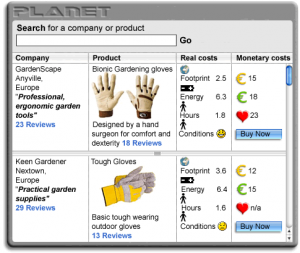A REconomy exchange system for the future?

As a new kind of local economy emerges, what might be a vision for an exchange system that would best support it? Here’s Gary Alexander’s thinking, an idea that combines the features of a gift economy and community exchange with complementary currencies and our aspirational characteristics for Transition Enterprises…
The problem we face now is that would-be Transition Enterprises find themselves in the existing business market, with all of its competitive and financial pressures. Those are often in conflict with these aspirational characteristics, even if the enterprises desire them. Therefore the purpose of our future REconomy Exchange System is to create a social and business context to remove or reduce those conflicts.
Suggested objectives of a REconomy Exchange System
1. It creates a mutual support system, linking Transition Enterprises with their customers, suppliers and other business services (including financial) so that all are aware of each other, and helps create a culture where they all choose to preferentially patronise each other where it makes sense. This immediately reduces competitive pressures on them from outside. They have something like a captive (but through choice!) market, a more mutually supportive supply chain and more finance options.
2. It uses public feedback from customers and across the supply chain, plus peer review and support, to maintain quality and enhance reputation. Reputation becomes a key factor in promoting stability, and hence resilience.
3. It provides transparency on finances, so that customers and suppliers know that there are no excessive profits or salaries.
4. It provides transparency of social and environmental criteria: showing that the enterprise is doing their best to follow good environmental practice, ethical trading and employment practices.
5. It reduces dependence on outside financial pressures and on the need for conventional money, through the use of gift economy and local currencies.
6. It reduces competition between similar Transition Enterprises by encouraging them to adjust their practices so they separate niches, serve somewhat different clients.
How might these objectives be met?
The system would incorporate some kind of local bank/credit union/building society that offered a mixture of conventional and complementary currencies (obj 5). See more thinking about a Transition Bank.
It would provide the means to make exchanges, with entries for members and directories of wants and offers, combining online and locally placed regular print copies and summaries on notice boards.
For example, the entries for businesses could show:
- Product information.
- Ratings and reviews from customers to establish public reputation (obj 2).
- Information on their environmental efforts (obj 4).
- Financial and social transparency (e.g. maximum and minimum income of staff, ethical policies) (obj 3).
- Offers and wants that allow use of a) conventional currency, b) built-in local currency and/or c) gift or service (obj 5).
The public face of the local economy could be some overarching organisation that all join, seen as a partnership or cooperative with elected co-ordinators. This organisation could run the local REconomy Exchange System.
The ethos would be that all are in it for mutual financial, social and environmental benefit (obj 1). In some places such organisations might already exist. Their function would be to to maintain the coherence and resilience of the whole local system including:
- Maintaining the stability of the overall partnership, including provision of means of handling conflicts constructively (obj 1).
- Ensuring the synergy of the various participants (obj 1 and 6).
- Provide external liaison and planning support.
- Help to maintain the values and sense of identity of the whole.
What do you think? Do you know of similar exchange systems already in place? Please let us know…
Many thanks to Gary Alexander for creating this content.







Connect